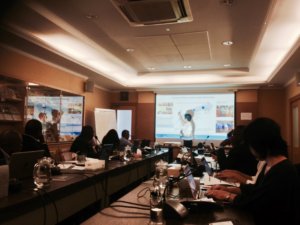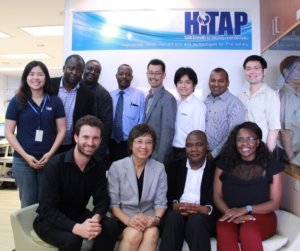The Government of the Republic of Zambia are working towards providing Universal Health Coverage (UHC) so that everyone has access to quality health care without having to face financial hardship. At present, Zambia provides the population with basic health care services free of charge at the primary health care level. The services that are available are set out in their National Health Care Package (NHCP). However, capacity constraints mean that in practice, the health services provided are not always reaching the people who need them most.
 To address this and improve the access and uptake of health care services, the Ministry of Health (MoH) of Zambia have embarked on a project to strengthen their basic health care services management (BHC for UHC Project), with the help of the Japan International Cooperation Agency (JICA). The project has identified that being able to effectively set priorities, such as which diseases to focus on and how best to allocate resources, is key to achieving UHC. The NHCP is currently under review in Zambia, so the need for evidence to inform any revisions and costing is greater than ever. JICA and the MoH are keen to learn from other countries that have successfully implemented an evidence-based policy formulation process.
To address this and improve the access and uptake of health care services, the Ministry of Health (MoH) of Zambia have embarked on a project to strengthen their basic health care services management (BHC for UHC Project), with the help of the Japan International Cooperation Agency (JICA). The project has identified that being able to effectively set priorities, such as which diseases to focus on and how best to allocate resources, is key to achieving UHC. The NHCP is currently under review in Zambia, so the need for evidence to inform any revisions and costing is greater than ever. JICA and the MoH are keen to learn from other countries that have successfully implemented an evidence-based policy formulation process.
Thailand is one of the earliest countries to have achieved UHC among the low and middle-income countries (LMICs) and through institutions such as the iDSI partner PRICELESS SA, visited the HITAP offices in July this year for a session focused on using HTA to provide evidence to inform the NHCP revision process.

The study tour comprised a four-day workshop and a day field trip to local health facilities and covered a range of topic areas including UHC and HTA development in Thailand, the role of HTA in various aspects of policy formulation and the process of developing the benefits package using a HTA approach. Further sessions were allocated for delegates from PRICELESS and the MoH Zambia to exchange ideas and explore potential areas for future collaborations.
The entire program was highly commended by the Zambian delegates. They were impressed with learning about the home-grown experience of Thailand in achieving UHC and institutionalizing HTA in the decision-making process. It was acknowledged that reviewing and costing of the NHCP, amongst others, would serve as a good starting point in introducing the concept of HTA to Zambia. Developing a policy brief on HTA was recommended as one of top priorities to gain stakeholders’ engagement in pushing the HTA agenda forward. The delegates were motivated by the potential role HTA could play in the quest towards achieving UHC in Zambia.